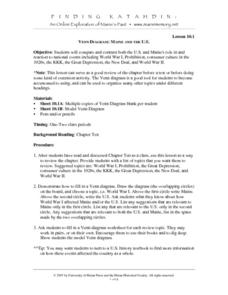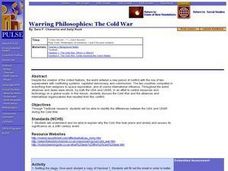Curated OER
Hidden Children
Eleventh graders explore, analyze and study a specific genocidal event in twentieth-century history, The Holocaust. They evaluate a variety of historical artifacts and synthesize the information gathered into their own in order to...
Curated OER
Venn Diagram: Maine And the U.s.
Students compare and contrast major events in U.S. histroy using a Venn diagram. They focus on how the events affected their state and the country as a whole. Events expolred include World War I, the Great Depression, Prohibition, the...
University of California
Principles vs. Practices
Have you ever wondered what your own World Order would look like? Scholars use primary and secondary documents as well as video clips to investigate and analyze the Cold War. Using the sources, the principles and practices of nations...
US House of Representatives
Hispanic Americans in Congress During the Age of U.S. Colonialism and Global Expansion, 1898–1945
To be Puerto Rican, in the words of one politician, is to be "foreign in a domestic sense." Young historians consider the American role in colonialism and its impacts on Hispanic Americans through the first part of the twentieth century...
US House of Representatives
Women Pioneers on Capital Hill, 1917–1934
As part of a study of the women elected to Congress from 1917 to 1934, groups research and then design a museum exhibit that describes the life and the congressional service of one of these women.
Teach It History
Crisis in Berlin: Decisions Game!
The Cold War did not begin with a bang, but with a swift tactic that reflected the Soviet Union's growing distrust of its former Allies. High schoolers choose either the USA or the USSR in a role play activity as they analyze why each...
US Institute of Peace
Perspectives on Peace
Is peace simply the absence of war, or is there more to the story? Young social scientists define peace in the second installment of a 15-part series. Groups work together to explore cultural concepts of peace and the peacemaking process...
Federal Reserve Bank
The Great Inflation: A Historical Overview and Lessons Learned
Your young economists will explore the roots of fears about high inflation by learning the effects of rising prices during the world wars and in particular the Great Inflation of the 1970s.
Annenberg Foundation
Teaching Geography: Workshop 4—North Africa/Southwest Asia
Can Jerusalem be equitably organized? Can Israel and Palestine be successfully partitioned? Part one of a two-part workshop looks at the geo-political history of Jerusalem while Part two investigates Egypt's dependence of the Nile River...
US House of Representatives
Black Americans in Congress Speak Their Mind
To conclude their study of Black Americans in Congress, groups select a statement made by one of the Members, examine the Member's profile on the provided link, and create a display that includes state represented, years of service, an...
Franklin D. Roosevelt Presidential Library & Museum
Pearl Harbor Activity #6: December 7 and September 11 - Infamy Twins?
Why did attackers on December 7, 1941, and on September 11, 2001, choose the targets they did? That is one of several questions young historians try to answer as they compare and contrast the two attacks. They also consider the...
American Institute of Physics
African Americans and Life in a Secret City
Imagine the lure of being offered a job at a secret site, working on a secret project, and earning higher wages! Such was the approach used to recruit African Americans to Hanford, Washington, one of several sites used to develop...
Curated OER
WWI Through the Film, Foot Soldiers
If your historians are watching the History Channel documentary, Foot Soldiers during their WWI unit, this plan has some simple recall questions and one referential/debate question ("What was the worst part of the war?") to ask after...
Curated OER
The Cold War and Development of Post-War America
Young scholars view examples of political advertisements during the years of 1952 through 1964. After viewing, they discuss how the Cold War and the threat of Communism affected the development of the United States. They compare the...
Curated OER
Locating The Cold War
Students identify major players in the Cold War and place them on a world map. They identify the two superpowers location on the map as well as their allies. Students analyze how the world divided itself.
Curated OER
Chapters 30 (sections 1 & 5) – The Cold War
In this U.S. history worksheet, students read assigned textbook pages on different topics associated with the Cold War and respond to 50 short answer questions.
Curated OER
World War I Key Figures Quiz
In this WWI key figures quiz worksheet, students complete an on-line quiz, clicking on questions and matching answers, scoring 1 point for each correct answer. A printed version is available.
Curated OER
World War II Quiz #2
In this WWII quiz worksheet, students complete an on-line quiz, choosing questions and matching answers. Students score 1 point for each correct answer; a printed version is available.
Curated OER
World War II Quiz #5
In this WWII worksheet, students complete an on-line quiz, choosing questions and matching answers. Students score 1 point for each correct answer; a printed version is available.
Curated OER
U.S. Home Front During World War II
In this U.S. home front-WWII quiz worksheet, students complete an on-line quiz, clicking on questions and matching answers, scoring 1 point for each correct answer. A printed version is available.
Curated OER
The Vietnam War
Students analyze U.S. involvement in Vietnam. In this Vietnam War lesson, students listen to their instructor present lectures regarding the Cold War as well as the conflict in Vietnam. Students study U.S. involvement in the armed...
Curated OER
Vietnam War: Kennedy Assassination
Students determine how the Kennedy assassination impacted the United States and, more specifically, the Vietnam War. In this 20th century American history lesson, students read books and view video clips of the event and then write...
Curated OER
The Early Tensions of the Cold War
Students uncover the roots of the Cold War. In this Cold War lesson, students research the political philosophies of the Soviet Union and the United States during the era as they define key vocabulary and discuss government systems....
Curated OER
Warring Philosophies: The Cold War
Students explain why the Cold War took place and ended. They analyze its significance as a 29th century event. Students identify the differences between the USA and USSR during the Cold War.
Other popular searches
- World War 1 Alliance
- World War 1 Causes
- Causes of World War 1
- History World War 1
- World War 1 Weapons
- World War 1 Maps
- World War One Causes
- World War One Propaganda
- World War One Weapons
- Blockade World War 1
- World War 11
- Nationalism World War 1

























